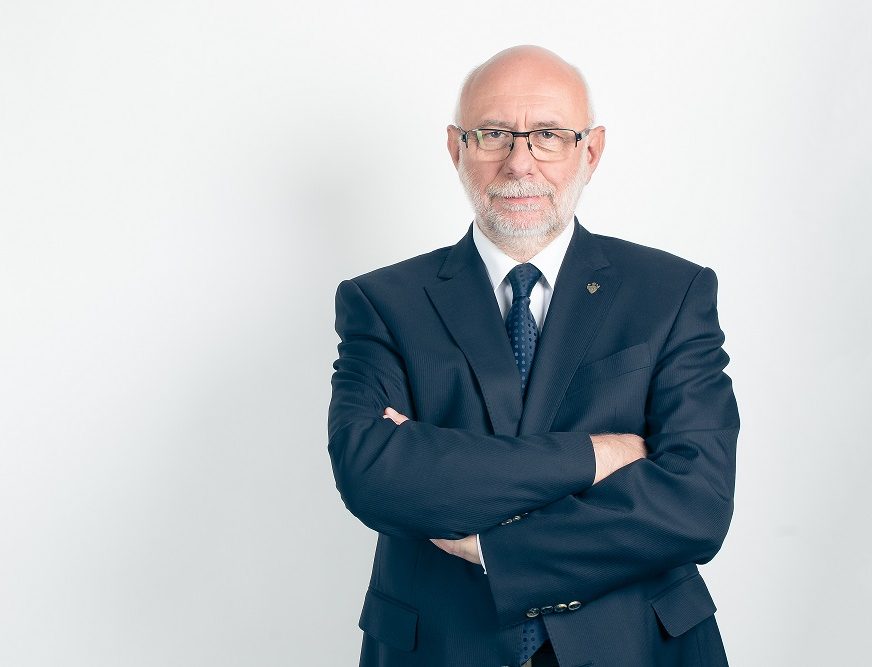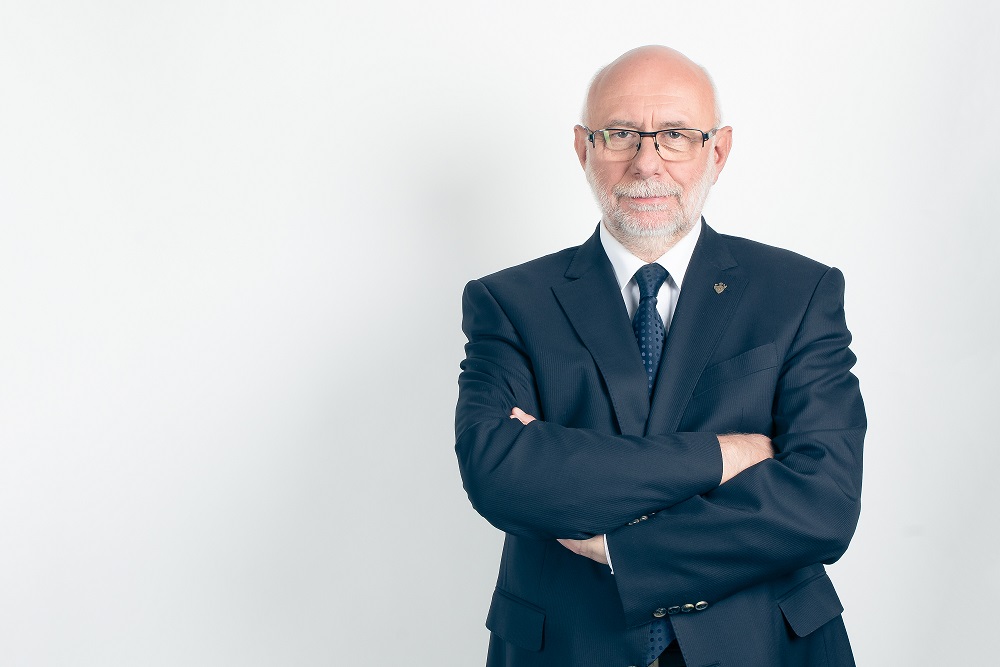

Professor dr hab. Jan Szmidt, professor at the Warsaw University of Technology: Innovation as a goal of science and business
Warsaw University of Technology is one of the greatest Polish universities. What determines this position and what influences the high level of learning? What competences does the university emphasise?
Warsaw University of Technology is a University in the full sense of the word. Of course we educate and conduct researches mainly in the fields of technology and science, but also in economic and social sciences.
The current level, both in the field of teaching and training for personnel and R&D, is an achievement of many years – decades, in fact, of our academic community. The process of developing didactic and scientific schools, constructing various workshops and methodologies of scientific research, but also its position in both science and didactics, not to mention the training of highly qualified staff, usually takes years. This process is difficult to speed up significantly, even with considerable financial resources. There are different examples in the world: when it comes to practicing science, we have always been guided by the motto of Stanislaw Staszic – the creator of Polish higher education – particularly technical – from the first half of the 19th century: “Learning remains an empty invention, a mere intellectual exercise or vain amusement, until it is put to use by the peoples of the earth”.
Technologies, materials, structures, new technological development trends and more – from generations, those were the areas in which academic personnel have always worked closely with the economy, in particular with the industry. These were mainly for domestic industry, but carried out in parallel with extensive international cooperation – to the extent possible,
of course, during a given period of almost 200 years of history of our University.
The competence of staff, students, PhD students and the link between science and didactics have always been the foundation of a high level of research and teaching activity. This is a topic for longer conversation but it can be briefly stated as such: not only do we pass on knowledge, but we shape the minds of our students, we ultimately shape their life attitudes including approach to work, a habit of lifelong self-learning, a passion for continuous development and, if necessary, the ability to redefine their professional profile. This is how we have been and do educate students, as well as young academics starting their scientific and didactic careers.
This set of skills is essential at the beginning of the 21st century and must also concern the development of soft skills. Our graduates quite quickly after graduation occupy various managerial positions in the economy, including management. Hence, a very important area of our teaching and research activity is management (Faculty of Management, Business School), but also law and administration, economics, philosophy (Faculty of Administration and Social Sciences).
Innovation starts with education. Does the Polish education system support innovative ideas and young innovators?
In fact, I have already said a lot on this subject above, characterizing the activities of our University. Of course, we support pro-innovative thinking and attitudes, both in the process of students’ education (e.g. a semester of creative thinking – interdisciplinary teams creating and solving complex subjects from various fields) and in the course of education in Doctoral Schools and development of young academic teachers. Great support for this type of activity are: Innovation and Technology Transfer Management Center and a commercial company – the Institute of Applied Research. This is a part of the accomplishments of my two terms as head of the Warsaw University of Technology. Students, doctoral students and university employees can not only supplement their knowledge of implementation and innovation or even technology transfer, but also obtain real, professional support in these areas. This type of support for the entire academic community, especially at a university with a technological profile, is nowadays an absolute necessity.
Science and business share a common goal – an innovative economy. How to create collaborative and effective ecosystems for funding innovation?
Financing innovative activities of people or companies, especially new, small and medium-sized start-ups, spin-offs, etc. – is a problem in itself. The State has the main tools in this regard, namely government agencies and research and development centers of large, capital-owning companies. This process costs a lot, and the effects are often lacking or delayed, often for many years. In spite of this, governments of technologically developed countries introduce a number of financial tools to support this type of activity (e.g. tax relief for R&D activity – this is 100% of expenditure on this purpose in Poland, in some countries even up to 300%). Every year, companies allocate very large funds for this purpose, sometimes comparable to government funds. Of course, it is very difficult to precisely define the amount of these funds, as they are highly diversified.
We often hear that business complains about difficult cooperation with scientists, while researchers say that only commercialization is important for business, which prevents the development of innovation. How to find a common path and effectively implement innovations? Technologies are a huge room for maneuver, and at the same time essential for the common good. How to get the most out of new technologies?
Yes, these problems have happened and are always and everywhere. We speak a different language, we have different, after all, sub-goals – although the final goal is common – new, innovative, often original technologies, a specific product, etc. Hence, it is very important to collaborate with companies, industry, research and R&D projects and finally implementation projects, but also implementation doctorates, joint R&D centers, technology parks, etc. Here, a huge field to play is the State, the Government, as a patron of such joint actions of science and business. Funds allocated for this purpose per balance are more than returned. Studies conducted in technologically developed countries show that 1 € invested in this area, after exceeding a critical mass of funds, pays for itself even 5-6 times over several years. Of course, in summary activities, and not in each of the individual projects. Many governments and companies understand this. Not everyone can afford it, but the effect with many years of sound investment is sure! We have many examples of this in the 20th and 21st centuries.
Warsaw University of Technology is distinguished by its outstanding research teams in technical sciences. How do you evaluate their “usefulness”? Do promising and innovative ideas often stay in drawers? If so, where is the cause?
In the 20th century, the Warsaw University of Technology provided many examples of efficiency in the development of innovative commercial activities. I encourage you to read the numerous studies in this area, for example on the occasion of the 100th anniversary of the WUT Tradition Renewal, which the University celebrated in 2015. On November 15, 1915 the Warsaw University of Technology was inaugurated under its present name with Polish as the language of instruction, and this day is celebrated annually as the Feast of our Alma Mater.
Right now isn’t worst, but the world has changed. Competition from new economic powers (China, South Korea, etc.), as well as 100 years of continuous financing of this area by large European economies, the USA and Japan, with the simultaneous isolation of Poland as a country remaining in the orbit of the USSR (along with the Second world war – 50 years – that’s a lot!) is strong and difficult to defeat. It is not easy to be at the forefront of the top. Nevertheless, we are ranked highly in the world as a partner for scientific cooperation, even often as a very desirable partner (also among the largest global companies). As Polish science and industry, we create competitive companies and conquer world markets also in the field of the most modern technologies! Our graduates easily find work in Poland, Europe and the whole technologically advanced world. I encourage you to check out the fate of our graduates – we have done very extensive research in this area for over 10 years!
Which technologies of the future will have the greatest impact on the way of increasing the innovation of products and services in enterprises?
Materials technologies, including chemistry and pharmacy, as well as electronic and ICT technologies. In both areas, we are at the beginning of the path to mapping the biochemical processes of nature and joining these processes, and the development of a huge area called artificial intelligence along with its cooperation with humans, their brains and more.
We are witnessing a fast progress of research connected with mapping in technology the processes occurring in nature, including in living organisms, and on the other hand connected with the area of artificial intelligence. Both these areas of research mutually reinforce each other. I think that in the future we will be surprised by many surprises – let’s hope they will be positive!



Professor dr hab. inż. Jan Szmidt
Rector of the Warsaw University of Technology in 2012-2020, Chairman of the Conference of Rectors of Academic Schools in Poland (KRASP) in the years 2016-2020, Honorary Chairman of the Conference of Rectors of Academic Schools in Polish (KRASP) 2020-2024.
A graduate of the Faculty of Electronics and Information Technology of the Warsaw University of Technology (1976). He obtained his doctorate at the same university in 1985, and in 1995, based on his academic achievements and dissertation, he obtained the degree of habilitated doctor. In 2005 he was awarded the title of professor of technical sciences. He specializes in issues in the field of microelectronics and thin film technology.
Initiator, contractor or manager of over 70 research and research and development projects (national and international), implemented in cooperation with teams from many Polish research centers (including: ITE, ITME, PWr, PŁ, PG, UMCS, AGH) and foreign ones (e.g. Imperial College London, JRC Ispra, Technical University in Liberec, Carnegie Mellon University). Prof. Jan Szmidt was also the organizer, member of the organizational and program committees and the chairman of several dozen national and international scientific conferences. In the achievements of prof. J. Szmidt, there are over 350 conference presentations (original and co-authored). He was repeatedly invited to give lectures and papers, both scientific and economic.
Co-author or author of over 400 scientific publications, co-author of 15 patents and patent applications.
Last Updated on April 20, 2021 by Karolina Ampulska